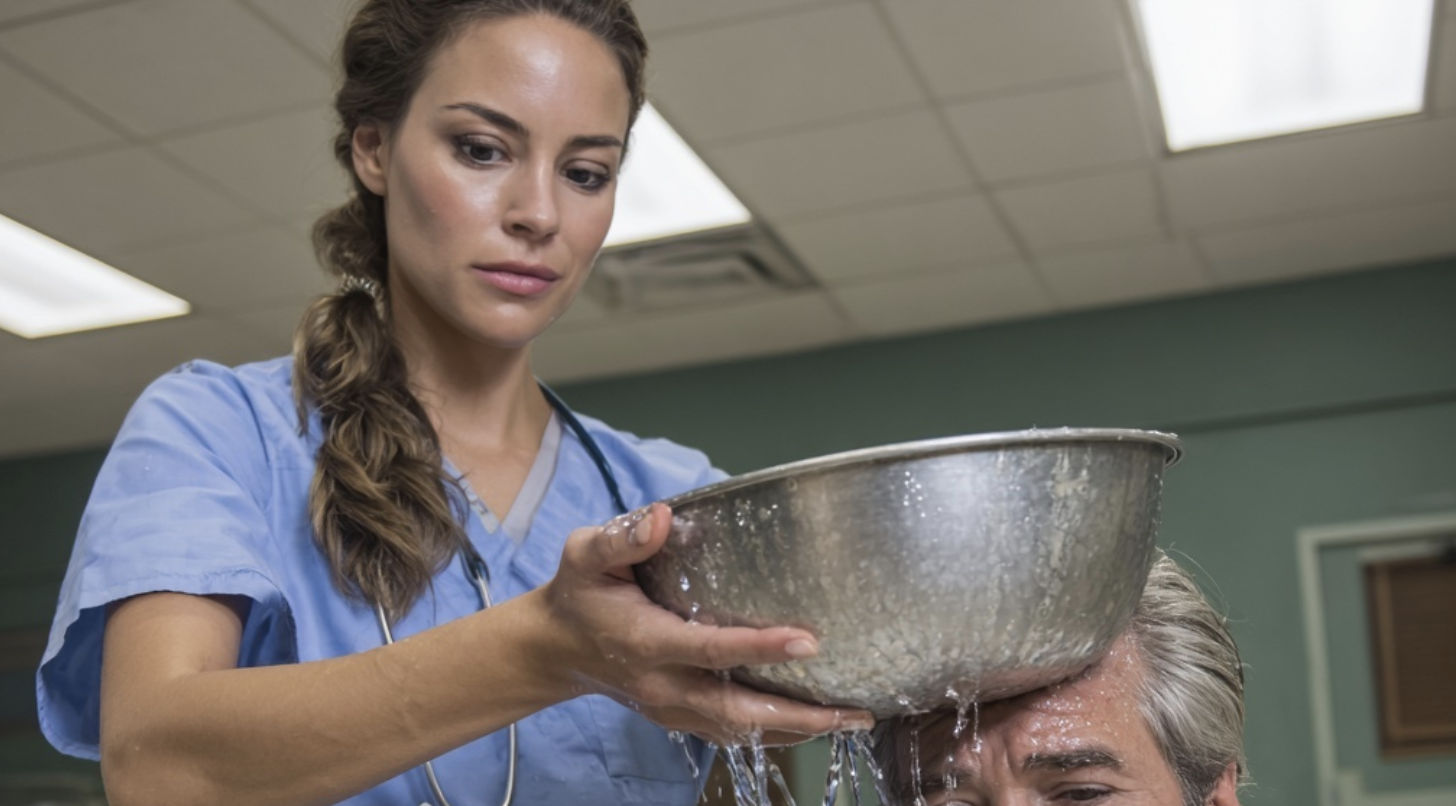The evening in the surgical ward dragged on unbearably long, as if time had slowed and the air had become thick and heavy, saturated with the smell of antiseptics and medicine. In the corner of the dimly lit nurses’ room, under the glow of a weak lamp, sat Ekaterina Sokolova—slender, with bright eyes and tousled fair hair. An open book lay on her knees—Chekhov, her solace, her escape from reality.
She spent her days studying at medical college, her nights working as an orderly, and these rare moments of quiet became a true holiday for her. Reading wasn’t just a habit—it was a way to survive, to keep a fragment of her soul alive among slop buckets and scrubbing after patients.
“—Well, well, what do we have here? Starting a literary club?”
The sharp, irritating voice shattered the silence. Katya flinched. The book vanished. She looked up—standing before her was Pavel Igorevich, the head of the ward. As always, he appeared silently, as if sneaking up to catch someone in a weak moment. Short, with thinning hair and a face frozen in an expression of perpetual annoyance, he held her book between two fingers as though touching something filthy.
“Chekhov?” he smirked. “How very noble—to be inspired by the classics. But, Sokolova, this isn’t some aristocrat’s salon; this is a hospital. You’re not here to read, you’re here to work. Or do you think we pay you to daydream?”
Katya slowly stood up. She felt no fear. Only the familiar, long-standing bitterness that had been building for years.
“First of all, they pay me so little it barely buys bread. And second, I’ve done everything. The wards are clean, the patients tended. Am I not entitled to a break?”
“Oh, is that so?” His voice grew louder. “Now you’re arguing with your boss? I’m warning you—one more word and you’ll be out of here so fast you won’t even remember this place!”
At that moment, the nurses’ room door opened. Svetka, Katya’s friend and colleague, appeared on the threshold. One glance at the scene and she understood immediately.
“Katya, quick, to room six! The old man feels bad, we need you!”
She grabbed Katya’s hand, pulled her into the hallway, and as they walked off, she called back with syrupy politeness:
“Sorry, Pavel Igorevich, we’ll fix everything right now!”
When they were far enough, Sveta exhaled.
“Katya, are you out of your mind?” she whispered, clutching her shoulder. “Why are you arguing with him? He’ll destroy you! You know he’ll do anything to keep his power. Just shut up, for God’s sake!”
“I can’t be silent when I see people being trampled,” Katya said quietly but firmly, eyes downcast. “He’s not a doctor. He’s a jailer.”
“Your words won’t change anything. But they’ll make things worse for you. Be sensible, I beg you.”
The words hung in the air. Sensible… Katya gave a bitter smile. For her, that word had lost all meaning long ago. Since she was fifteen, she had lived by a different law—the law of necessity: act, risk, fight. Closing her eyes, she tore herself for a moment out of the hospital corridor—the home of her childhood rose before her mind’s eye.
Sunlight streaming into the living room. Her father’s ringing laughter—strong, confident, successful. He lifted her into his arms and gave her a huge doll with a porcelain face and silky hair. That gift became a symbol of a world full of love and stability, where everything seemed eternal.
But that world collapsed in a single evening. Her father was beaten in the stairwell—not for robbery, but as a warning. Business rivals. Doctors saved his life, but a spinal injury condemned him to disability. The cheerful man became a furious, suffering one, hating the world and unloading his pain on his family.
Her mother, Maria Petrovna, couldn’t bear the burden. After her husband’s death, she suffered a heart attack—the doctors spoke of nervous exhaustion, a breakdown. At fifteen, Katya was left alone. She sold the doll, then everything else of value, to buy medicine. Then she went to work—first as a cleaner, then as an orderly.
She saw patients suffer, doctors walk by with indifference, human life devalued. And then, looking at her mother’s pain and remembering her father’s torment, she made a vow: she would become a doctor. A real one. One who hears, who sees, who doesn’t turn away. Not like Pavel Igorevich. Those memories were her foundation, her weapon. They kept her from breaking.
By around two in the morning, when the hospital sank into sleepy silence, Katya dozed off again with the book on her knees. Voices and noise from the ER woke her. She jumped up and ran there.
On the couch sat a man—clothes torn, face dirty, hair matted with filth. He reeked of sweat and alcohol. He clutched his right side; blood seeped between his fingers.
“What happened?” Katya asked, approaching.
“Stabbed… in the side… for an empty wallet…” he rasped.
Pavel Igorevich emerged from his office, drawn by the noise. He cast a disdainful glance at the man.
“Well, who do we have here? A bum from the trash?”
“He’s got a stab wound,” said the duty nurse. “He needs urgent surgery.”
The head didn’t even come closer. He looked him over, shook his head.
“What, am I supposed to clean up after people like this now? He’s filthy, drunk, no papers, no insurance. Who’s going to pay? I’m not messing up the OR for a tramp.”
“But he could die!” blurted the young nurse.
Pavel Igorevich smirked coldly.
“Let him die. It’s natural selection. People like that choose their own fate. Call the police. I’m not wasting resources on trash.”
He turned and left. The staff stood frozen. The man moaned, paling, losing consciousness. Time was slipping away.
And suddenly, something snapped inside Katya. It was all too familiar. Her father. The long wait for an ambulance. The indifferent doctor. “We’ll wait until we finish our tea.” The thought flared like fire. All warnings, all fear evaporated. Only fury remained. Blind, pure, righteous.
She happened to be holding a clean enamel bedpan. At that moment it felt not like a pan, but something heavy, almost a weapon. Svetka rushed to her:
“Katya, stop! Think of your mom!”
But Katya no longer heard. She strode quickly toward the head’s office. The door burst open without a knock. Pavel Igorevich sat leafing through a logbook.
“You are not a doctor!” she shouted, her voice so sharp he flinched, nearly dropping the book. “You took an oath! The Hippocratic oath—to help anyone in trouble! Doesn’t matter if they’re rich or poor, clean or dirty! But you—you’re just a murderer by neglect!”
The head slowly rose. His face twisted with rage.
“Who are you to lecture me?!” he hissed. “Your job is to mop floors and empty bedpans! Not read books and stick your nose where it doesn’t belong! Get out! Right now!”
That was the last straw.
“Empty bedpans?” Katya repeated, her voice now ice-calm. “Fine. Then allow me to perform my duties.”
And before anyone could react, she stepped forward and upended the contents of the enamel pan—thankfully empty, smelling only of bleach—right over Pavel Igorevich’s head.
For a moment the office froze in dead silence. The air itself stood still. Drops of water trickled down his balding temple, onto his collar. Then he screamed—not words, but some strangled animal howl.
“FIRED! Get out! I’ll ruin you! I’ll sue you! You’ll remember me for the rest of your life!”
He stormed out toward the restroom. And in the ER, where fear had reigned moments ago, something shifted. The fear melted. The senior nurse, silent until now, sharply nodded to the orderlies:
“Quick! Stretcher! To the OR! The patient needs help—now!”
A wheel, stuck for years, finally began to turn. Justice, though through madness, prevailed.
Katya silently gathered her belongings—a couple of books, a framed photo, an old backpack—and left the hospital. The morning air was cool, but she felt heat inside. She had no regrets. None. But she knew: consequences were coming. Being fired was only the beginning. Humiliated and enraged, Pavel Igorevich would likely file a police report. Which meant trial, fines, maybe even a criminal case.
Home was quiet. She slipped in, trying not to wake her mother. But Maria Petrovna sat by the window in a shawl, as if waiting.
“Katya, you’re home so early… What happened?”
“It’s fine, Mom,” Katya smiled, though inside everything tightened. “We just finished early. How are you feeling?”
They talked about trifles—the weather, bread, the need to buy more medicine. Katya tried to stay calm, but her heart ached with worry. The job was hard, but stable. Now—emptiness. What next?
The lie didn’t last long. A couple of hours later, the doorbell rang. On the threshold stood the district officer—a young lieutenant with tired eyes.
“Ekaterina Sokolova? You need to come to the station. There’s a statement from Pavel Igorevich.”
Her mother understood. Her face went pale; her hand clutched her chest. Katya told her everything: about the homeless man, the refusal of help, the bedpan. Maria Petrovna listened silently. In her eyes—fear, pain, but also something else… pride. She feared for her daughter, but she knew: Katya acted with conscience. Just as her father would have.
The following days passed in anxious waiting. Katya scoured job postings, but without references her chances were slim. She awaited a summons, a court date. Worst of all—the thought that if anything happened to her, her mother would be left alone.
On the third day, the phone rang. It was Sveta.
“Katya, something weird is going on!” her voice trembled. “Today some people came to the hospital—suits, fancy jeeps. They asked about you, about that incident. And Pavel Igorevich… he gave them your address! Be careful, something’s off!”
Katya didn’t have time to answer—the doorbell rang again. Her heart stopped. “It’s started.” On the threshold stood two men in impeccable suits, serious-faced.
“Ekaterina Sokolova?”
“Yes…” she whispered. “Just please, not here. My mother’s sick, don’t scare her.”
They exchanged glances.
“We’re not from the police,” said one gently. “We came to thank you. We’re Dmitry’s brothers.”
“Dmitry?”
“The one you saved. That very patient.”
They told her everything. Their younger brother Dmitry was heir to a large business. To prove to his father he could be independent, he went out on the street without money or papers. His foolish challenge almost ended in death. They found him only after the surgery, in intensive care.
“He wants to see you,” one brother said. “Could you come down? He can’t walk yet.”
Katya, stunned, nodded and followed them. A black Mercedes waited by the entrance. The door opened. On the back seat—the same man, now clean, in a cashmere sweater, wearing an expensive watch. He looked embarrassed.
“Hello, Ekaterina,” he said. “I… I don’t know how to thank you. You saved my life. If it weren’t for you…”
“It wasn’t me,” she replied quietly. “It was you, wanting to live.”
“No,” he shook his head. “You were the one who didn’t turn away. Tell me, how can I help you? Money, education, job—anything you want.”
Katya looked at him and suddenly laughed—nervously, with relief.
“First help me not get jailed for hooliganism,” she said.
He smiled.
“Already taken care of. That’s no longer a problem.”
A week later he came himself—with roses, a cake, awkward movements but sincerity in his eyes.
“May I… invite you for tea?” he asked.
For the first time in a long while, Katya truly smiled, stepping aside to let him in.
“Come in.”
Half a year passed. They married. Quietly, modestly, only close family. A year later, their daughter was born—Olga, named after Katya’s grandmother. Life changed. Not like magic—but as the result of courage, truth, and stubborn adherence to her principles.
They moved into a spacious, bright apartment. Katya insisted—no luxury décor, only coziness and warmth. The most important thing—Maria Petrovna. The best doctors examined her, prescribed proper treatment. The stress disappeared. In a few months she didn’t just recover—she blossomed. Laughing again, cooking again, holding her granddaughter in her arms again.
Three more years later Katya graduated medical school with honors. And one day she returned to the same hospital where she’d once been kicked out in disgrace. Now—not as an orderly, but as Dr. Ekaterina Sergeevna, a specialist with a degree, personally invited by the chief physician.
On her very first day, she ran into Pavel Igorevich in the corridor. He froze. His face twisted. He recognized her. He understood—before him stood not just a doctor, but the wife of a man whose family could crush him with a single phone call. His power, his connections, his threats—all of it collapsed.
Without a word, he turned and went to his office. An hour later, the chief physician had a resignation letter on his desk—“of his own accord.”
Katya watched him go—fast, almost running. She could have stopped him. Could have demanded accountability, could have made his life a nightmare. But she didn’t.
She just watched him leave. And in that moment, she understood the main thing: sometimes the strongest act of justice isn’t revenge, but silent superiority. People devoid of compassion have no place in medicine. And the best you can do is let them leave. And make room for those who remember: every person deserves help. Even if they are homeless. Even if they are dirty. Even if they are nobody.



